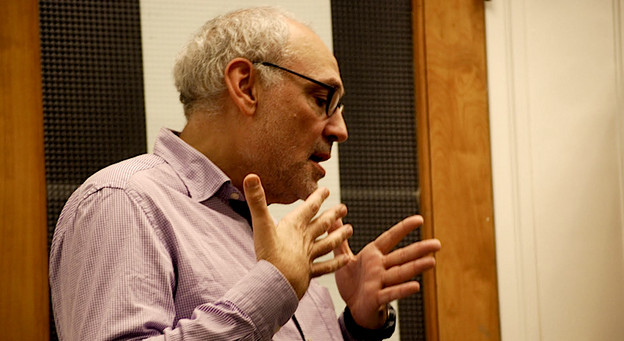An introduction to Charles Bernstein's reading from 'Recalculating'
'Strike because you are abandoned.'

[The following is the text of an introduction I gave before a reading by Charles Bernstein from his book Recalculating on April 16, 2013, at the Kelly Writers House in Philadelphia.]
In Recalculating (Chicago, 2013), Charles Bernstein follows every imperative invoked from the late Emma Bee Bernstein in its epigraph, among them “Pump up the radio,” “Retrace your route in reflection,” and — profoundly — “Race your future to the finish line.” For Bernstein, via Fernando Pessoa, poets are fakers whose faking is so real they even fake the pain they truly feel. Reversing effectiveness with an eye on redemption, he seeks to kill two stones with one bird. Recalculating Wallace Stevens’s “Loneliness in Jersey City,” he offers us “Loneliness in Linden,” where — as is not the case in Stevens — “Jews do Jewish things” with failed language: cobbling together the six million tunes of the never-heard-of-in-modernism dead.
In “Fold,” the poet makes a prose-poem list of sentences in which transitive verbs are identical to direct objects, facing faces, voiding voids, gulping gulps, fearing fear and hating hate. Re-addressing friends and poetic colleagues, he offers a poem in honor of Bob Perelman in which Bob is presented only by way of possessives: what he has, what he writes, not what he is. His numinous nominalism. His casual attire surrealism. His direct address to entropic homeopathic Jewishness. In “I Will Not Write Imitative Poetry,” Bernstein — teacherly — sends himself scolded to the blackboard, forcing himself to write sixteen times that he will not write imitative poetry, he really won’t, he won’t, he won’t, he promises he won’t. It’s a wash-your-mouth-out-with-soapistry, an ars poetica as bold as the poetic-pedagogical absolutism it opposes, a few don’ts for the post-imagist. Thus he recalculates – re-understands – innovative writing in the progressive socio-literary lineage, the “pen [being] tinier than the sword,” free verse being “not a type of poetry but an imperative to liberate verse from constraints no longer applicable for a new time and new circumstance.” He recalculates a pragmatic progressive politics of language, thinking aloud through Lakoffian reformist optimism: “All the signs say no passage; still, there must be a way.”
And so he loves originality so much he keeps copying it. When Charles Bernstein at 60-plus recalculates, he submits unironic internet-age radical idealism to 1930s-style vaudeville: “Poetry wants to be free.... Or, if not, available for long-term loan.” And misanthropy in the style of Shecky Green or Morey Amsterdam: “I love humanity; it’s people I can’t bear.” And this laugh line: “I am a Jewish man trapped in the body of a Jewish man.” He’s unready, unwilling and unable – the title of the poem in which these lines occur – but he’s still constantly hearing Emma’s drive-fast/race-to-the-finish imperatives, and so his poems are ready, willing and astonishingly able.
Yes, this personal recalculation gives us poems of incomprehensible and uncomprehended mourning – “I was the luckiest father in the world / until I turned unluckiest” – but it also makes possible poems like “Strike!” – right out of the Popular Front, a list poem telling you to strike, but you don’t know if you’re aggressively thrashing or nobly resisting. “Strike because your only hedge fund is your bare hands.” “Strike because you are sick of all that’s called new and despair that nothing changes.” “Strike because you are abandoned.”
“Recalculating” – the book but also the title poem – means that “The Jew is a textual construction,” which suggests the realization, finally, after all these years, that “You’re not even there when you’re there.” “The Jew” is a poem not about this poet but another – revered bearded wandering father and surrealist Jewish vaudevillian – turned 80 years old for the occasion of the poem: Jerome Rothenberg. The poem consists of 24 Talmudic joke-stories inflected by Cagean contemplation: “A reader complains about the obscurity of a line of verse and seeks a Jew’s counsel. ‘Obscurity is like the yeast in a cake. It is long acting to ensure the dough rises on time.’”
Recalculating means: rising on time.
Just in time for election day 2008. Just in time for some serious autopsychographia. Just in time, in the era of digital unoriginality, for realizing that computers will never replace poets because computers won’t take that much abuse. Just in time for retracing your route in reflection and for putting your hands on the wheel. Just in time for poet-fakers who’ve learned for years in poems to fake the pain they really feel. “Strike because you are abandoned” is a line exactly as political as it is personal.